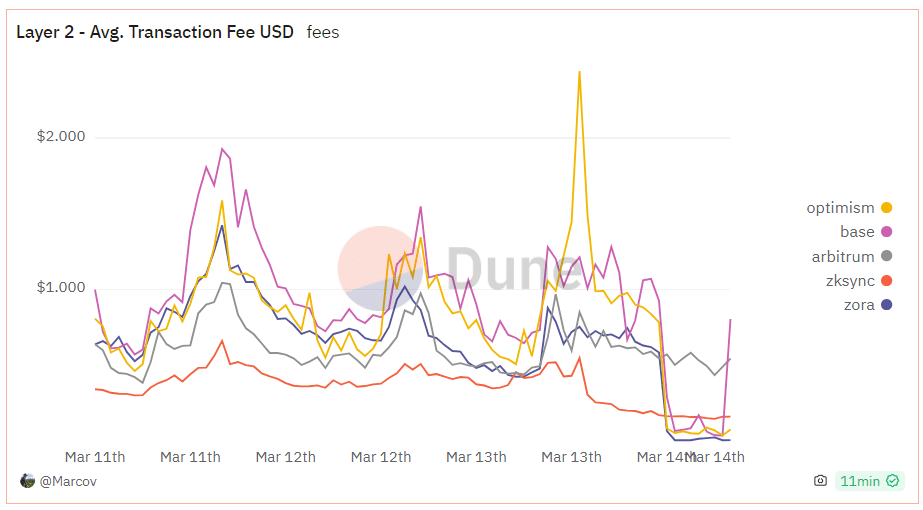Dencun, the latest upgrade to grace the Ethereum network, might have fulfilled its vision to address high fees, as data confirms a significant drop in average transaction fees across Ethereum layer-2 (L2) networks.
Following an extended period of anticipation, the Dencun upgrade finally went live on the Ethereum mainnet on March 13, as confirmed by Ethereum Foundation Protocol Support Tim Beiko.
According to data provided by Dune, L2 protocols utilizing blob transactions have experienced a significant decrease in transaction fees, with platforms such as Base, Optimism, and Arbitrum seeing some of the largest drops shortly after Dencun went live.

As of March 11, Optimism had an average transaction fee of $1.587, while Base recorded a figure of $1.927, data from Dune confirms. However, these values have dropped substantially, with Optimism and Base both recording an average transaction cost of $0.035 at the reporting time.
This change represents a massive 97.7% drop in Optimism’s fees and a 98.8% decline in the value witnessed with Base. Zora also recorded an impressive slump, as fees collapsed 99% from $1.423 on March 11 to $0.003 at the time of writing, per data from Dune.
Starknet saw similar drops, with the average cost for in-app swaps on Argent X, a Starknet wallet, slumping from $6.82 a few days ago to $0.04 shortly after Dencun went live. It bears mentioning that the Starknet Foundation also promised to introduce a mechanism for fee reduction in parallel with Dencun.
For the uninitiated, the Dencun upgrade seamlessly merges the “Cancun” and “Deneb” updates. It aligns with Ethereum’s roadmap known as “The Surge,” with a primary focus on bolstering the network’s scalability.
The upgrade introduces a novel concept called “proto-danksharding” (EIP-4844), aiming to fine-tune gas fees and enhance data management for layer-2 networks and rollups.
Dencun’s ultimate goal is to reduce transaction costs while boosting throughput across the Ethereum ecosystem. Notably, this objective could be achieved through a type of transaction called “shard blob transactions,” introduced with EIP-4844.
The Ethereum ecosystem has witnessed the utilization of over 4,000 blobs so far. While other layer-2 protocols have swiftly implemented these blob transactions, Arbitrum plans to join the party with the upcoming launch of its ArbOS hypervisor. Meanwhile, Blast saw a 1-hour downtime due to issues related to Dencun.













